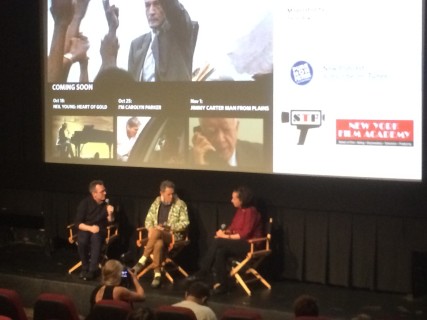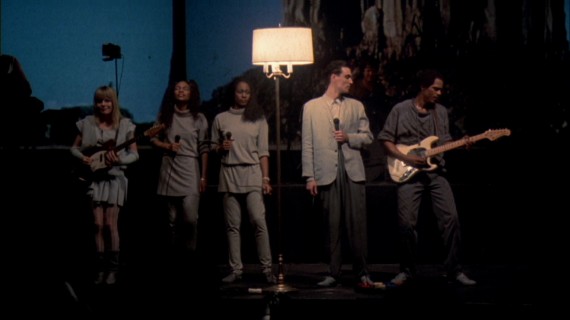Writing by Megan Scanlon. Megan works at the American University of Beirut. She has written for the DOC NYC blog and the Journal of Community Engagement and Scholarship. Megan is a volunteer at the Bronx Documentary Center where she contributes to documentary programming. Follow her on instagram and twitter @meganscanlon5
Stranger Than Fiction headed into week three of its Jonathan Demme retrospective last Tuesday, welcoming another packed house for the director’s 2003 film, The Agronomist.
The Agronomist tells the story of Jean Dominique, a journalist whose heart beat for Haiti. As a child, Dominique traveled the country with his father, who wanted him to get to know the people of Haiti. On his son’s identity, his father was clear: “You are not French, British, you are not American, you are Haitian.” On these trips Dominique fell in love with the people, the peasants who worked the land. Inspired, he studied in France to become an agronomist agriculturalist, and returned to Haiti to work with farmers he knew could take care of themselves. A lover of cinema, he also wanted to bring national cinema to Haiti. Films that showed challenges and rebellion were not viewed favorably and in 1965 the Haitian dictatorship permanently banned the cinema club. Not one to be deterred, Dominque breathed new life into Radio Haiti when he purchased it in 1968. The first independent radio station on the airwaves, Radio Haiti broadcasted in Creole and aired local and international news, unlike the government owned stations that broadcasted exclusively in French. For the poor, illiterate, and Voodoo practicing population, Radio Haiti was an informational lighthouse drawing attention to the hegemonic forces that threatened not just to erode, but engulf the peasants’ way of life. Dominque’s role as anchor was literal as he cultivated strength and support for his listeners. An electric storyteller, beyond the power of his words was the power of his delivery. Together, the passion in his prose was fiery, incisive, and uncontainable. His words resounded for those not given a voice, a choice, and when stories of overthrown dictatorships by oppressed citizens in Iran and Nicaragua were shared, Haitians were quick to understand.
Continue reading…
Maybe for the first time since taking over the Monday Memo (over 80 weeks ago now!), the conversation reverberating from the critical community on documentary film this week is overwhelmingly centered around films newly available via streaming platforms (13TH, AMANDA KNOX, AUDRIE & DAISY, and the soon to be released Adam Curtis project HYPERNORMALISATION). Following its world premiere of Ava DuVernay’s 13TH at the New York Film Festival on September 30th, the film became available worldwide via Netflix just a just a week later, igniting a firestorm of white hot responses in the press. In reference to 13TH, both Scott Feinberg of The Hollywood Reporter and Kristopher Tapley of Variety asked the question, “Why Not a Documentary for Best Picture?,” while others like the Washington Post’s Bethonie Butler and Deadline’s Pete Hammond lauded the film as “powerful” and “masterful,” respectively. Opinions have essentially been unanimously extolling among critics like Nonfics’ Daniel Walber, Kenneth Turan of the Los Angeles Times, and The Guardian’s Wendy Ide and Charlie Lyne.
As part of the New York Film Festival, 13TH subjects Kevin Gannon, Khalil Gibran Muhammad, Jelani Cobb, Ashley Clark, and Malkia Cyril took part in a panel moderated by Eugene Hernandez, the result of which is now available on the latest episode of The Close-up podcast. the DuVernay herself made the rounds, appearing in conversation with Cara Buckley of The New York Times, Esquire’s Corey Atad, Film Comment’s Ashley Clark and Juleyka Lantigua-Williams of The Atlantic. Just as DuVernay takes on the US prison system, Sam Barsanti of A.V. Club reports that Jay-Z is producing a six-part documentary series for Spike TV titled TIME: THE KALIEF BROWDER STORY, about the 16-year-old high school kid from New York who was arrested in 2010 for allegedly stealing a backpack and New York’s broken criminal justice system. And in the same vein, Anne Thompson list four docs that define the Black Lives Matter movement at IndieWire, while actor and activist Danny Glover shared his six favorite racially conscious documentaries currently streaming with Christopher Campbell of Nonfics.
Stranger Than Fiction, however, remains on the big screen at IFC Center. This week our six film retrospective of the documentary work of Jonathan Demme co-presented by the New York Film Academy continues with THE AGRONOMIST, about the Haitian radio journalist Jean Dominique. Director Jonathan Demme and Radio Haiti-Inter journalist Michele Montas with both be on hand to present the film and participate in a post-screening Q&A. Tickets for the event are available here.
Continue reading…
Writing by Megan Scanlon. Megan works at the American University of Beirut. She has written for the DOC NYC blog and the Journal of Community Engagement and Scholarship. Megan is a volunteer at the Bronx Documentary Center where she contributes to documentary programming. Follow her on instagram and twitter @meganscanlon5
Stranger Than Fiction headed into week two of its six-week Jonathan Demme retrospective on Tuesday night, welcoming another full house of docufiles for Demme’s 1987 performance feature, Swimming to Cambodia. A quick survey of the audience revealed that the room was split between veterans and new recruits of the Spalding Gray monologue, a grand story that revolves loosely around Gray’s role in Roland Joffe’s The Killing Fields, a film about the Khmer Rouge regime in Cambodia.
At a surface level, “monologue” seems a wholly inadequate description, scarcely containing Gray’s exquisite cosmic theater, and yet, in its capacity for depth, it’s the monologue that gives Gray a space, an outlet, a release for his seismic prose.
Shot in 35 mm, the magic of the flicker adds graininess and texture, tangible, real, infinitesimal imperfections that are dwarfed by the grotesqueness of the content it overlays–the Khmer Rouge. Lead by Pol Pot, the Khmer Rouge unleashed a genocide of shockingly horrifying proportions, but as Gray says, “Who needs metaphors and poetry for hell, this happened, kids torn about like fresh bread in front of their mothers, on this earth.”
Continue reading…
Amidst a rather busy week of the doc circuit, DOC NYC revealed its Oscar predicting 2016 Short List, naming 15 films to screen at the festival with the director or other special guests present. As Anne Thompson noted in her coverage of the announcement at IndieWire, last year the DOC NYC Short List had ten titles overlapping the subsequent Oscar Documentary Short List. Among this year’s selection was Ava DuVernay’s incisive Netflix prison doc 13TH, which opened the New York Film Festival on Friday night to a standing ovation and a shower of glowing reviews. At IndieWire, Eric Kohn called the film “the most relevant movie of the year.” The Guardian’s Jordan Hoffman wrote that its “an articulate, no-nonsense cup of iced water splashed in my face telling me to wake the f-ck up.” Even Manohla Dargis of The New York Times fully endorsed DuVernay’s film, calling it “powerful, infuriating and at times overwhelming…(while it) challenges your ideas about the intersection of race, justice and mass incarceration in the United States.” Similarly rhapsodic reviews were logged by Vikram Murthi at Movie Mezzanine, Odie Henderson at RogerEbert.com, Richard Brody of The New Yorker, and Steven Zeitchik of The Los Angeles Times. You can watch the press conference with DuVernay herself over at the Film Society of Lincoln Center’s website.
Of course, there are other docs on offer this year at NYFF, as Basil Tsiokos made abundantly clear in his overview of the nonfiction offerings at What (not) To Doc. Likewise, the staff at IndieWire listed seven docs to catch at the fest if you’re able, including Kasper Collin’s I CALLED HIM MORGAN, which Richard Brody, a jazz diehard, seems to have loved. Also kicking off on Friday was the International Documentary Association’s three day Getting Real conference, which a handful of diligent members of The D-Word live blogged (in three separate categories – sustainability, diversity, other conference happenings). Leading up to the conference, Realscreen published a piece by the founding members of the NYC Doc Producer’s Alliance on issues surrounding industry and career sustainability. Meanwhile across the pond, Christine Bardsley recommended a trio of docs to watch at the upcoming London Film Festival via BFI.
Our fall season of Stranger Than Fiction celebrating the documentary work of Jonathan Demme continues tomorrow at IFC Center with SWIMMING TO CAMBODIA. Director Jonathan Demme, as well as producer Renée Shafransky, will be on hand to discuss the film in a post-screening Q&A. Tickets for the screening are still available here.
Continue reading…
Writing by Megan Scanlon. Megan works at the American University of Beirut. She has written for the DOC NYC blog and the Journal of Community Engagement and Scholarship. Megan is a volunteer at the Bronx Documentary Center where she contributes to documentary programming. Follow her on instagram and twitter @meganscanlon5
“Some things sure can sweep me off my feet.”
-Burning Down the House
Stranger Than Fiction kicked off its six-week Jonathan Demme retrospective on Tuesday night, welcoming a full house of Talking Heads fans ready to experience Stop Making Sense on the big screen. The last time the Heads ever performed for an audience, Stop Making Sense Was filmed over the course of four Hollywood nights. Demme’s 1984 classic is a living, breathing testament to the power of music, the brilliance of David Byrne and the Talking Heads, and how the next best thing to a live concert is a beautifully shot film of a live concert.
Continue reading…










